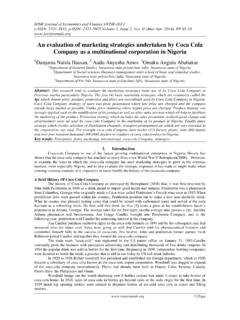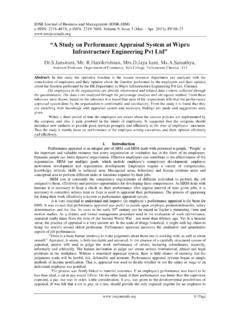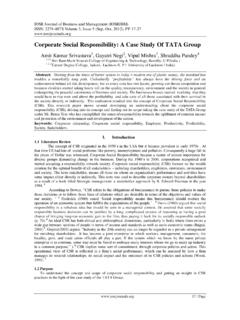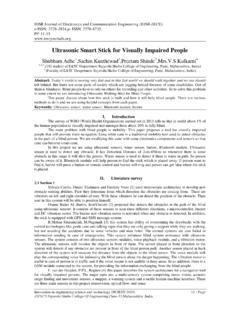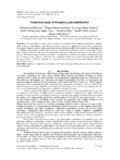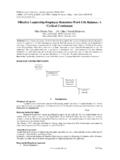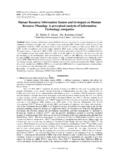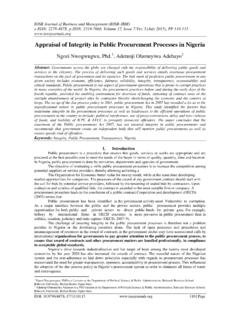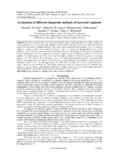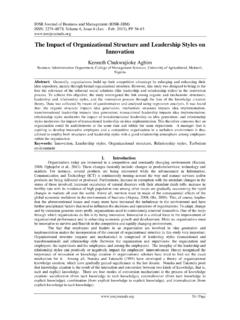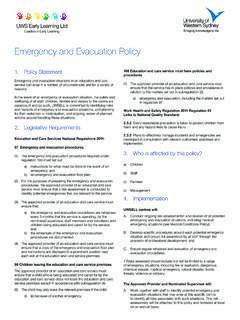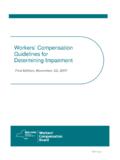Transcription of Corporate Governance, Firm Size, and Earning Management ...
1 IOSR Journal of Business and Management (IOSR-JBM) e-ISSN: 2278-487X, p-ISSN: 2319-7668. Volume 10, Issue 4 (May. - Jun. 2013), PP 77-82 77 | Page Corporate Governance, Firm Size, and Earning Management : Evidence in Indonesia Stock Exchange Dwi Lusi Tyasing Swastika STIE Malangku e wara, Malang Abstract: Purpose Thepurpose of this paper is to evaluate the impact of the Corporate governance regulationsimplementation and firm size onthe Earning Management for food and beverages companies in Indonesian Stock Exchange. Design/methodology/approach The multiple regression is utilized to test this relationship at 95% governance was proxied by board of director, audit quality, and board independence.
2 Firm size was represented by natural logarithm of total assets. Earning Management was measured by Jones model withdiscretionary accruals. Findings Using data from the year 2005 annual reports of 51 food and beverages listed companies,including the composite index, the results showed that twoof the Corporate governance variables, namely board of director and audit quality, as well as firm size are statistically significant in explaining Earning Management measured bydiscretionary accruals. Research limitations/implications The regulations on Corporate governance were implementedin 2005, but not all of food and beverages listed companies implemented the regulations in 2005. Practical implications An implication of this finding is that regulatory efforts initiated after the1997 financial crisis to enhance Corporate transparency and accountability did not appear to result on better Corporate performance.
3 Originality/value This is one of the few studies which investigates the impact of regulatory actionson Corporate governance on Earning Management immediately after its implementation. Keywords Corporate governance, Firm size, Earning Management Paper type Research paper I. Introduction Agency conflicts are expected to be higher in widely heldcompanies due to divergence of interest among contracting parties (Jensen andMeckling, 1976). One such conflict may arise between inside owner-managers andoutside minority shareholders. Fama and Jensen (1983) argue that the existence ofindependent directors would result in a more effective monitoring of the board and limitmanagerial opportunism. That is because independent directors are supposed to lookafter the interests of outside minority shareholders.
4 Thus, to reduce agency conflicts,independent directors can be appointed to the board. Following this line of argument, ifindependent directors succeed in discharging their monitoring role and ensuring that theboard makes decision in the best interests of all shareholders, opportunistic behaviorcould be avoided; hence, company performance should improve. Another characteristic that is seen to influence a board sability to monitor is board size. Boards can become lesseffective in controlling Management as board size increasesdue to problems of coordination and communication(Jensen, 1993). Nevertheless, results regarding the effect ofboard size on earnings Management are not so authors find a positive association between board sizeand earnings Management (Chin, Firth, and Rui [2006] for313 firms in Hong Kong), and others a negative relation(Xie, Wallace, and Dadalt [2003] for a sample of 110 USfirms) or even no relation (Bradbury et al.)
5 [2006] for firms inMalaysia and Singapore). Another important characteristic of boards is whetherthe roles of the chairperson and the chief executive officer (CEO)are vested in different people. Corporate governance guidelinesassume that a board is less able to perform a monitoringrole when the CEO is also the chairperson of the duality indicates that less control is likely to be exercisedover Management s activities and behavior. Empiricalevidence on the association between CEO duality andopportunistic managerial behavior, however, seems not tosupport this theory since most authors do not find any significantrelation (Bugshan, 2005; Cornett, Marcus, Saunders,&Tehranian, 2006; Davidson et al.
6 , 2005).In monitoring the financial discretion of Management , it isthe audit committee that is likely to provide shareholderswith the most protection in maintaining the credibility of afirm s financial statements. Thus, independent audit committeescan potentially improve the quality and credibility offinancial reporting. The best practice standard establishes100 percent of independent directors; and, though in moststudies the percentage of independent directors is higherthan 50 percent, it does not reach 100 Corporate governance, firm size, and Earning Management : Evidence in Indonesia stock exchange 78 | Page percent. On the contrary, inthe samples of Yang and Krishnan (2005) for US andBugshan (2005) for Australia there are 82 percent of independentdirectors in the audit committee, in Garc a-Osmaand Gill de Albornoz (2007) for Spain the mean is 56 , results in this area are also conflicting.
7 WhileKlein (2002) reports a negative relation between earningsmanagement and audit committee independence, otherauthors find no association between both variables (Yangand Krishnan [2005] in the USA, and Garc a-Osma and GilldeAlbornoz [2007] in Spain). Development of Hypotheses Firm Size Firm Size is defined as the nature log (ln) of total assets (Chen et. Al., 2005; Ghazali, 2010; Hasanand Ahmed, 2012). It is used in this study to control the likely impact of firm size on the discretionary accruals of the sample firms. It is argued that the larger firm sizemeans the higher the expected agency problem that the firm is likely to experience (Abed et. Al., 2012);furthermore, given the fact that large firms have more resources and earn higher profit, Grey and Clarke (2004) note that those firms are more likely to avoid managing earnings through discretionary accruals.
8 Quite a number of studies control for firm size including Zhu and Tian (2009) and Shehu (2011). The effect of firm size on earnings Management is controversial (Kouki et al, 2011). We have two opposite point of views:(1) the first defended byLennox (1999), Gore et al.(2001), Klein (2002), Xie et al. (2003), Abdul Rahman and Ali (2006) advanced a negative relationship; larger firms with sophisticated internal control systems, more competent auditors(Big5) and have better reputation; are more able to avoid earnings Management . This support the idea that smaller companies are subject to less control fromauthority and therefore, managers are more likely engage in earnings Management activities (Abed et al, 2012); (2) the opposite view suggests a positive relation between size and earnings Management ; larger companies with more capital market pressure, morebargaining power; are more likely to manage earnings than are their counterparts of small firms(Moses, 1987; Myers and Skinner, 2000; Nelson et al, 2002).
9 A negative association between firm size and Earning Management is hypothesized: H1. There is a significant negative between firm size and Earning Management . Corporate Governance Corporate governance is represented by board of director, audit quality, and board independence. Board of of directors can play a significant role in control inagency problems (Garcia-Meca and Sances-Balesta, 2009). From an agency perspective, the ability ofthe board to act as an effective monitoring mechanismdepends on its independence of Management (Beasley, 1996;Dechow et al., 1996). According to Fama and Jensen (1983),independent directors on boards make boards more effectivein monitoring managers and exercising control on behalf ofshareholders.
10 Dalton et al. (1999) showed that larger board members provide more advantages for their companies throughsharing alternative experience which might decrease the incidence of earnings studies have used board size as a determinant of earnings Management , but the influence of board of director hasreceived mixed results in previous studies. Abdul Rahman and Ali (2006) found a positive relationbetween earnings Management and board of director. However, Xie et al. (2003) and Peasnell et al. (2005) found anegative association between earnings Management and board of director. Interestingly, Abbott et al. (2000) found norelation between quality of earnings and board of director. Thus, based on agency theory, it can be hypothesized that: H2: There is a significant positive relationship between board of director and earnings Management .
